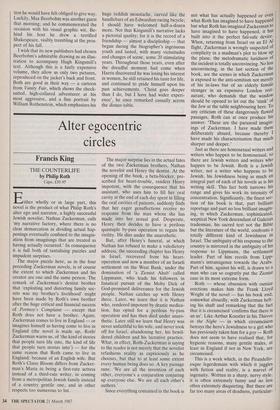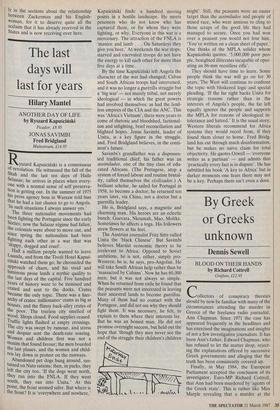Alter egocentric circles
Francis King
THE COUNTERLIFE by Philip Roth Cape, f10.95 Either wholly or in large part, this novel is the product of what Philip Roth's alter ego and narrator, a highly successful Jewish novelist, Nathan Zuckerman, calls `my narrative factory, where there is no clear demarcation in dividing actual hap- penings eventually confined to the imagin- ation from imaginings that are treated as having actually occurred.' In consequence it is full both of tantalising puzzles and impudent surprises.
The major puzzle here, as in the four preceding Zuckerman novels, is of course the extent to which Zuckerman and his creator are one and the same person. The remark of Zuckerman's dentist brother that 'exploiting and distorting family sec- rets was my brother's livelihood' might have been made by Roth's own brother after the huge critical and financial success of Portnoy's Complaint — except that Roth does not have a brother. Again, Zuckerman comes to live in England — or imagines himself as having come to live in England (the novel is made up, Roth/ Zuckerman warns us, of 'the kind of stories that people turn life into, the kind of life that people turn stories into') — for the same reason that Roth came to live in England: because of an English wife. But Roth's Claire Bloom differs from Zucker- man's Maria in being a first-rate actress instead of a third-rate writer, in coming from a metropolitan Jewish family instead of a country gentile one, and in other respects too numerous to list. The major surprise lies in the actual fates of the two Zuckerman brothers, Nathan the novelist and Henry the dentist. At the opening of the book, a beta-blocker, pre- scribed for heart-trouble, renders Henry impotent, with the consequence that his assistant, who uses him to fill her oral cavity at the end of each day spent in filling the oral cavities of patients, suddenly finds that her eager genuflections receive no response from the man whom she has made into her sexual god. Desperate, Henry then decides to have a perilous quintuple by-pass operation to regain his virility. He dies under the anaesthetic.
But, after Henry's funeral, at which Nathan has refused to make a valedictory address, the succeeding chapter has Henry in Israel, recovered from his heart- operation and now a member of an Israeli settlement on the West Bank, under the domination of 'a Zionist Ahab' called Lippmann, who leads his followers in fanatical pursuit of the Moby Dick of God-promised deliverance for the Jewish people. Nathan catches up with Henry there. Later, we learn that it is Nathan who, rendered impotent by drastic medica- tion, has opted for a perilous by-pass operation and has then died under anaes- thetic. Later still we learn that Henry was never unfaithful to his wife, and never took off for Israel, abandoning her, his bewil- dered children and his lucrative practice. What, in effect, Roth-Zuckerman is saying to the reader is not merely that the novelist refashions reality as capriciously as he chooses,, but that to at least some extent every human being does so. A key passage runs: 'We are all the invention of each other, everyone's a conjuration conjuring up everyone else. We are all each other's authors.'
Since everything contained in the book is not what has actually happened or even what Roth has imagined to have happened but what Roth has imagined Zuckerman to have imagined to have happened, it has built into it the perfect fail-safe device. When, returning from Israel on an El Al flight, Zuckerman is wrongly suspected of complicity in a madman's plot to blow up the plane, the melodramatic luridness of the incident is totally unconvincing. No less unconvincing, in the last section of the book, are the scenes in which Zuckerman is exposed to the anti-semitism not merely of his in-laws but of an elderly female stranger in an expensive London rest- aurant, who demands that the window should be opened to let out the 'stink' of the Jew at the table neighbouring hers. To any criticism of these dangerously flawed passages, Roth can at once produce his answer: 'These are the paranoid imagin- ings of Zuckerman. I have made them deliberately absurd, because thereby 1 have made his characterisation that much sharper and deeper.' Just as there are homosexual writers and writers who happen to be homosexual, so there are Jewish writers and writers who happen to be Jewish. Roth is a Jewish writer, not a writer who happens to be Jewish, his Jewishness being as much an integral part of each of his novels as is his writing skill. This fact both narrows his range and gives his work its intensity of concentration. Significantly, the finest sec- tion of his book is that, part brilliant reportage and part no less brilliant imagin- ing, in which Zuckerman, sophisticated, sceptical New York descendant of Galician tradesman, his sacred text not the Bible but the literature of the world, confronts a totally different kind of Jewishness in Israel. The ambiguity of his response to the country is mirrored in the ambiguity of his response to Lippmann, the settlement leader. Part of him recoils from Lipp- mann's intransigence towards the Arabs. Part of him, against his will, is drawn to a man who can so cogently put the Zionist case in its most extreme form.
Roth — whose obsession with outsize erections makes him the Frank Lloyd Wright of the novel — has his book end, somewhat absurdly, with Zuckerman heft- ing his shaft and remarking that the fact that it is circumcised 'confirms that there is an us'. Like Arthur Koestler in his Thieves in the Night — in which circumcision betrays the hero's Jewishness to a girl who has previously taken him for a goy — Roth does not seem to have realised that, for hygienic reasons, many gentile males, at least in England if not in New York, are circumcised.
This is a work which, in the Pirandello- esque legerdemain with which it juggles with fiction and reality, is a marvel of ingenuity. Written in a sharp, nervy style, it is often extremely funny and no less often extremely disquieting. But there are far too many areas of deadness, particular- ly in the sections about the relationship between Zuckerman and his English- woman, for it to deserve quite all the acclaim that it has already received in the States and is now receiving over here.



















































 Previous page
Previous page